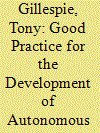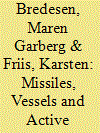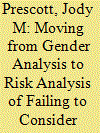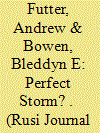|
|
|
Sort Order |
|
|
|
Items / Page
|
|
|
|
|
|
|
| Srl | Item |
| 1 |
ID:
178270


|
|
|
|
|
| Summary/Abstract |
Advanced surveillance systems can autonomously identify military targets. A consequent automated decision to attack without human assessment and authorisation of the action will almost certainly be in breach of international law. Separating decisions and actions identifies the role of machine-made decisions and the human ability to assess them and to authorise action. High autonomy levels in a weapon system place new responsibilities on organisations and personnel at all stages of procurement and use. In this article, Tony Gillespie builds on recent UN expert discussions to propose that detailed legal reviews at all procurement stages, including pre-development, are needed to ensure compliance with international law. Similar reviews are also needed for automated systems in the decision-making process.
|
|
|
|
|
|
|
|
|
|
|
|
|
|
|
|
| 2 |
ID:
178271


|
|
|
|
|
| Summary/Abstract |
In 2019, Russia’s Chief of the General Staff, Valery Gerasimov, presented a ‘strategy of active defence’, a possible prelude to the forthcoming Russian military doctrine. This article examines this strategy with particular emphasis on the role of precision-guided missiles, tactical nuclear weapons and the role of the navy. It provides insights on the shape of new Russian military doctrine and the military threat Russia might represent to the West. Maren Garberg Bredesen and Karsten Friis conclude that the active defence concept may imply a lowering of the use-of-force threshold. Russia’s continued build-up of tactical nuclear weapons integrated into the conventional forces reinforces this concern.
|
|
|
|
|
|
|
|
|
|
|
|
|
|
|
|
| 3 |
ID:
178268


|
|
|
|
|
| Summary/Abstract |
In wars fought within and ultimately for the support of civilian populations, the gender dimension becomes a vital one. Different efforts to address gender in military operations have shown increasing sophistication in the past few years. One thing that has not been satisfactorily developed, however, is an overarching theory of gender’s operational relevance that would allow it to be fully normalised in military planning and operations. To fill this gap, Jody M Prescott suggests that the gender analysis that is part of military staff products at all operational levels needs to evolve to also consider risk to the mission and its personnel.
|
|
|
|
|
|
|
|
|
|
|
|
|
|
|
|
| 4 |
ID:
178272


|
|
|
|
|
| Summary/Abstract |
With NATO activity increasing and great power competition building between the US, Russia and China across the Arctic, the Alliance needs to consider a new strategic approach to the region. Duncan Depledge examines how NATO’s traditionally cautious approach to the Arctic is now outmoded given the recent pressures posed by Russian military activity, Chinese ambition and the renewal of US strategic interest in the region. In response, NATO must go beyond simply restating its interest in the Arctic and devise a new strategic approach that normalises Alliance engagement, keeps a weather eye on Chinese ambitions, and leaves scope for expanding Alliance activity still further as the region is transformed by environmental and geopolitical change.
|
|
|
|
|
|
|
|
|
|
|
|
|
|
|
|
| 5 |
ID:
178274


|
|
|
|
|
| Summary/Abstract |
The coronavirus crisis has exacerbated the challenges posed by Brexit, the Integrated Review and a separatist Scotland, and shined new light on the UK nuclear weapons debate. This combination of issues has bolstered the argument that the resources allocated to sustaining and replacing the ‘Trident system’ should be used to develop societal resilience and support the economy. The pandemic has also highlighted possible vulnerabilities of the Trident system and the opportunity costs for other parts of the military, and aggravated the uncertainties of a fluid domestic political and constitutional context within which decisions about the UK’s nuclear future will be made. But while this climate may lead the UK government and electorate to look again at the broader opportunity costs and geopolitics of remaining in the nuclear club, Andrew Futter and Bleddyn E Bowen argue that the most likely result will be business as usual, making it difficult to see when, if ever, the country will disarm in the foreseeable future.
|
|
|
|
|
|
|
|
|
|
|
|
|
|
|
|
| 6 |
ID:
178276


|
|
|
|
|
| Summary/Abstract |
In June 2014, 100 years after the start of the Great War, Roy Hodgson picked an England FIFA World Cup football squad.1 In this article, Jo Spear uses the names of those 23 players to illustrate some of the personal and international costs of the conflict that raged between 1914 and 1918. The article does not claim to have found the direct relatives of the England squad, but people in history with the same or similar names and from nearby places, wherever possible.
|
|
|
|
|
|
|
|
|
|
|
|
|
|
|
|
| 7 |
ID:
178263


|
|
|
|
|
| Summary/Abstract |
How can policing communications deny terrorism its desired effect? British police have steadily mobilised social media to reach stakeholders. In May 2017, Greater Manchester Police communications were effective in mitigating communitarian divisions sought by the Islamic State and in inciting empathy, solidarity, feelings of security and police collaboration. Furthermore, by writing and describing the community, events and actors in ways that serve specific priorities, they were able to take advantage of these platforms. In this article, Jill S Russell and Pablo de Orellana deploy historical and discourse analysis approaches to analyse how police communications depicted the event, civic identity, the police force itself and the response.
|
|
|
|
|
|
|
|
|
|
|
|
|
|
|
|
| 8 |
ID:
178261


|
|
|
|
|
| Summary/Abstract |
The story of activists who resisted the Islamic State in Mosul and Raqqa reveals new dimensions of resistance activity in two major cities of the former caliphate. Mike Stevens provides a comparison of the experiences of resistance actors in the two cities and suggests lessons applicable to current military ambitions in the sphere of information warfare.
|
|
|
|
|
|
|
|
|
|
|
|
|
|
|
|
| 9 |
ID:
178267


|
|
|
|
|
| Summary/Abstract |
Following its departure from the EU on 31 January 2020, the UK is focusing on strengthening its existing bilateral partnership with the African Union (AU). Assisting the AU in implementing its Women, Peace and Security (WPS) agenda provides one avenue to achieve this aim and supports the implementation of the UK’s own WPS agenda. Drawing on interviews with representatives from the AU, British diplomats and African in-country experts, Georgina Holmes assesses how the UK engages with the AU to facilitate gender-responsive, people-centred peacekeeping and reflects on how the AU could benefit from continued UK support.
|
|
|
|
|
|
|
|
|
|
|
|
|
|
|
|
|
|
|
|
|